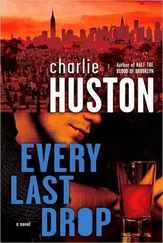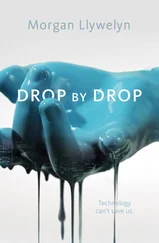Jiminy looked hurt, put-upon, and Marco wanted to say something, but he didn't. “They don't ask that shit at the border,” Jiminy said. “Just are you a citizen, right? And how long'll you be in Canada?”
“Look, man,” Alfredo was saying, “you were probably still in junior high the first time I went up to Canada-in Ontario, this was-and maybe they might have been cool about it back in those days, but believe me, with the war on and all these draft dodgers-who I support, by the way, so don't get me wrong-it's going to be a trip and we are really going to have to play it right. Get it through your head, man-this is no game, no three-day rock festival where you can just go on home when it's over. This is survival we're talking about here-they're driving us off the _ranch,__ for Christ's sake. What do you think that says?”
Marco wasn't listening anymore, because he was seeing that border, a vague scrim of trees, a checkpoint dropped down on the highway in a pool of darkness, and what was he going to do if they questioned him? Work up a fake ID? Get out three miles down the road and sneak across through the scrub? Was there a wire? Was it electrified?
“Keep the light steady, will you?” Bill said. “I can barely see what I'm doing here.”
“So what are we supposed to be then,” Jiminy wanted to know. “The Washo Unified Lacrosse Team? With our cheerleaders and band along for our triumphant tour of British Columbia?” He pushed himself away from the bus and hovered over the twin craters his feet made in the mud. “Easy for you to say, but you don't have to worry-you're too old for the draft.”
The rain was nothing more now than the faintest drizzle, and the flanks of the bus shone with it as if they'd been polished. The moon glistened in the mud. From inside the bus, the sound of giggling.
Alfredo didn't answer right away. “That's right,” he said finally, “I'm too old by four years and three months. But that doesn't mean I'm not looking out for you and Marco and Mendocino Bill and all the other cats here. This is a war, man, and we are going to win it. Drop City North, right? Am I right?”
“It's still America,” Marco said. “The forty-ninth state. They've got the selective service up there too.”
“Yeah, but we're going to be so far out there nobody's even going to know we exist.”
In the morning, while Marco was up atop the bus with Star, trying to fashion scavenged two-by-fours into the world's biggest luggage rack, he reached over the side for another stick and found himself peering into the upturned faces of Lester and Franklin. “So what's this I hear?” Lester wanted to know, his voice padded with cotton wool as if he were afraid he might bruise it. He tugged at the brim of his oversized porkpie hat to shield his eyes from the sun. “You all are really going to up and desert Franklin and me? To go where-to fucking Alaska?” And then he began to chuckle, a low soft breathless push of air that might have been the first two bars of a song. “You people,” he said, and he was still chuckling, “you are seriously deranged.”
Marco had a hammer in his hand, so he didn't have to say anything in reply. He just banged a couple of nails into the corner at the front of the box, and yes, the humped steel roof of the bus was going to be a problem, but he was thinking if he built the rack up high enough and they strapped everything down as tightly as possible, it ought to get them where they were going-as long as the roof didn't crumple under all that weight. Star said, “Maybe so,” and she was smiling so wide you would have thought her cheeks would split. “But in case you haven't heard, Alaska's the real thing, the last truly free place on this whole continent.”
“Shit,” Lester said, grinning now himself, “that's what I thought about California-till my ass wound up in Oakland. And the Fillmore's worse than Oakland, even, and the Haight's worse than that.”
“What about us?” Franklin asked, and he was staring up at them out of a pair of yellow-tinted shades that looked like the top half of a gas mask. “They going to take down the back house too?”
“That's what I want to know,” Lester put in. “And Sky Dog. And Dale. Because it's going to be kind of unfriendly around here when they come in with those bulldozers, you know what I mean?” He dropped his head, kicked a stone in the trammeled mud that was already baked to texture. Then he looked up again, one hand shielding his eyes from the sun. “But what I really want to know is are we invited? Because we got the Lincoln and there's no way you're going to fit everybody in that bus, and Pan's car, and whatever-that beat-to-shit Bug Harmony's got.”
Marco looked down from on high. He didn't like Lester and he liked Sky Dog even less, and he hadn't forgotten that day in the ditch either, or what they'd done to the treehouse, but this, this really strained credulity. Lester was serious. He really thought he was part of all this, really believed in the credo of the tribe, in peace and love and brotherhood. Or he wanted to. Desperately wanted to. It was a hard moment, and Marco felt like Noah perched atop the ark and looking down his nose on all the bad seed toiling across the sodden dark plains below. He looked at Star and she looked away.
“Or maybe I'm talking to the wrong person, maybe I ought to talk to Alfredo. Or Norm.”
“I hear they got gold up there,” Franklin said, and he was straining to look up too. “Is that what you're going to do, pan for gold?”
“Hey, come on, man,” Lester said, “let bygones be bygones, right? Brothers, right?”
A long moment ticked by. No one said a word. Marco could feel the bus shift beneath him as Reba and Merry climbed aboard with two more boxes of dishes, pots and pans, tools, cutlery, preserves. They were going to mount the big KLH speakers from two racks in the back of the bus and run the record player off a car battery, so they could have music at night when they pulled the bus off by the side of the road or into a public campground. Maya was fixing up curtains for the windows and Verbie and her sister were cutting up a roll of discarded carpet and fitting it to the floor. Even Pan was contributing, doing up a fish fry with chips and coleslaw so the women could be free of the kitchen and concentrate on the business at hand. Marco could hear the soft thrum of the voices below him, the sound of something growing, taking shape in a unity of effort that made all the pimples and warts of Drop City fade away to nothing. He felt good. Felt omnipotent. Felt like one of the elect.
“So what do you say?” Lester's voice floated up to him, soft as a feather. “We invited or not?”
Marco plucked a nail from his shirt pocket, set it in place and drove it home with two strokes of the hammer. The sound exploded out of the morning like two gunshots, one after the other, true-aimed and fatal. He shrugged. “Hey,” he said, and he could hear the finality in his own voice, “it's a free country.”
PART FOUR.THE DRUNKEN FOREST
Life is here equally in sunlight and frost, in the thriving blood and sap of things, in their decay and sudden death.
— John Haines, _The Stars, the Snow, the Fire__
The honeymoon was over before it began, and that was a shame, worse than a shame-it was a crime. A crime committed by a man with a gun, a Remington semi-automatic.22-caliber Nylon 66, judging from the flattened pieces of lead Cecil Harder dug out of the corpses of Bobo, Hippie, Girl, Loon and Saucy. Of course, the slugs could have come from any.22 rifle, but Joe Bosky had a Nylon 66-he favored it, as many did, for the lightness of its plastic stock-and Joe Bosky was the only man on this green earth who would even so much as think of shooting somebody's dogs. You didn't shoot dogs, and you didn't burn down people's cabins or rape their wives or put a bullet between their shoulder blades as they were gliding past in their canoe. Sess Harder was trying to live off the land, and everybody knew that. The better part of his income came from furs, and without dogs to run the looping forty-odd miles of trapline he'd inherited from Roy Sender-and improved and extended on his own-he was out of luck. Everybody knew that. A child knew that.
Читать дальше












